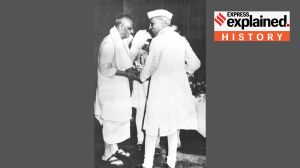With high growth,you get an additional amount of inflation…If I had to bet on growth,I would bet on 9 per cent
Cornell University professor Kaushik Basu joined the finance ministry in December 2009 as its chief economic advisor
Cornell University professor Kaushik Basu joined the finance ministry in December 2009 as its chief economic advisor. In this Idea Exchange moderated by Sunil Jain,Opinion Editor,The Financial Express,Basu speaks about tackling inflation and says the world will be worse off after the crisis in Japan
Kaushik Basu: I would love not to speak on inflation but nowadays,I dont get away without speaking on it anywhere. In government meetings when someone utters the word inflation,people slyly look at me and gradually everyone turns to me as if I am inflation sitting right there. It is an extremely uncomfortable feeling.
On the question of growth and inflationary pressures,we are not arguing that growth has to create greater inflation,but with high growth,youll get an additional amount of inflation. With the rapid growth that India is aiming for,youll get two additional percentage points of inflation,that is our calculation. My expectation is that the March inflation,which means the year-end,will not go below 7.5 per cent. But our calculation is that the new fiscal year will begin with inflation below 7 per cent. There have been policy initiatives like fiscal consolidation and monetary tightening measures throughout the year and these usually take effect after a lag. There are two complexities in inflation we must keep in mind. When you go in for financial inclusion,whereby you are encouraging people to put their money back into circulationin a bank or in mutual fundsits a good thing,but it has the negative effect of bringing money into circulation. That creates inflationary pressures. Good things have side effects and financial inclusion has a side effect of inflationary pressure.
Also,black money being brought into circulation can create inflationary pressures,and you need to counteract that. One more observation: an economy cannot have more than one money-creating authority. So every country has its own single bank. But with globalisation,as the world is becoming a single economy,we are getting back into the predicament that we had gotten out of. This is not an argument against globalisation,but it is a potential tension point between different countries central banks. Inflation management today needs inter-country coordination of policy,inter-central banks coordination of policy and we try to do that alreadyat G20,for example.
On growth,I am bullish. We put out a forecast of nine per cent and Dr C Rangarajan (Chairman of the Prime Ministers Economic Advisory Council) quite independently has hit upon the same figure. In the long run,for growth you need knowledge generation,you need innovation and invention. Patenting activity appears to be picking up in India,although not as sharply as it ought to.
As for corruption,it needs a wide-based effort by the government. You cant be ham-handed and stop every kind of activity in the name of stopping corruption. You dont want to bring the economy to a halt. So you have to devise intelligent policies to bring down corruption. A good,vibrant country,a social democracy deserves better. We cant afford corruption even if we have to compromise on growth a little. The CBI has a role to play,vigilance authorities have a role to play,but so does the way we devise our laws,our policies. Heres an example straight out of law and economics: bribery. Bribe-giving and bribe-taking are treated pretty much on par under Indian law. But there is a class of cases where people have to give bribes for something they actually deserve to getthat is a harassment bribe. In such cases,we should consider amending the law,to make bribe-giving legal while bribe-taking remains illegal.
Sunil Jain: But there must be a cap on the bribe given.
Kaushik Basu: Yes,but if it is for something legal which youre supposed to get,the punishment should be doubled for the bribe-taker. If you make bribe-giving in harassment cases legal,I think bribery will go down because in the present system,once a bribe incident has taken place,the bribe-takers and the bribe-givers interests are the same. So theyre going to hide it. But if in a case of harassment bribe,the bribe-giver is covered under the law fully,it changes the equation. This is game theory: break the collective interest of the bribe-taker and the bribe-giver.
M K Venu: In the procedure of law,there is already scope for a bribe-giver to seek immunity while helping the prosecuting authorities with information on the bribe-taker.
Kaushik Basu: Yes,under Section 24. But the way Section 24 has been used,its not always clear that you get the cover. Im saying it should be much more upfront. Its not an exemption in the law,it is an anti-bribery law.
M K Venu: How long do you think oil prices will remain moderate because of the crisis in Japan?
Kaushik Basu: Its difficult to say because it could play out in many different ways. But the larger point is extremely important: since so much of our oil need is imported,we are hugely dependent on the prices. If oil prices rise sufficiently high,it is going to hit us adversely. It will put some of our calculations into jeopardy. We believe that fiscal consolidation is very important.
Surabhi: On the Japan crisis,how do you see it affecting the global economy,apart from oil prices?
Kaushik Basu: The net expectation is that the world is worse off. Youve lost a huge amount of resources,you have lost human capital,and the world is worse off by that.
Sunil Jain: But if Japan is essentially contributing nothing to global growth,is it a big deal?
Kaushik Basu: It is buying a lot of goods and it is selling a lot of goods. So suddenly when that window closes,it has a huge negative effect on countries. Japan is a big enough economy,so it is going to create a negative shock for sure. But in the long run,it is more complicated. When an economy like Japans begins to rebuild,it can have an almost Keynesian effect of becoming a driver of other countries stepping in to supply to that.
Sunny Verma: On corruption,can deep cuts in tax rates help in controlling the black money problem?
Kaushik Basu: A deep cut in tax rates will bring down corruption. But Im not in favour of that. If you make tax rates zero,then of course,tax evasion will also go to zero. But you have to pay a certain amount of tax; its a rapidly growing economy,and once youre above a certain level,you ought to contribute to society. I dont think for that reason tax rates should be brought down. But we do need a better whistle-blower law so people have confidence.
Himani Kaushik: Rangarajan has been saying you should continue to tighten the monetary policy when there is pressure from high inflation. What is your stand?
Kaushik Basu: Long-standing studies show that monetary policies take a long time before their effect is fully felt across the economy. However,with a very sharp tightening,the lag is going to be shorter. If you do a sudden very sharp tightening,the other indicators in the economy will feel the impact. Unemployment tends to go up. You suddenly pull back inflation,and factories will begin to close down and unemployment will rise. Monetary policy and fiscal policy,these two macro policies are fascinating because unlike areas like auction,there is a very good theory,it is almost like engineering science. And theres no reason not to make use of that because it is available.
Coomi Kapoor: What is holding us back from disclosure of money that is brought into the country?
Kaushik Basu: Youre talking about putting disclosures in the public space,even if we dont know whether it is legal or illegal money? This is maybe worth considering. Is it worthwhile putting peoples bank accounts on public display? I dont know,but I would hesitate to put everyones private wealth and money movement on public display. But I agree,on corruption,there are no two ways. It is demeaning for a country to have this kind of corruption. But I have not looked into this,sufficiently. I am just beginning to work on corruption. Right now,I am looking at bribery and bribery control.
M K Venu: The biggest generator of black money in the domestic economy is real estate. Why doesnt the government make this transparent?
Kaushik Basu: I feel very strongly about this. Ive looked at rural ownership. Its changed hands and people have mortgaged land to one another and many people lay claim to the same piece of land,so it is not easy. But I agree that the law is a mess,there should be much cleaner titles.
Sandip Das: In September,India exported onions and in December,you ban it. In March,you lift the ban. We seem to have no policy regarding cash crops like onion and potato,supply items.
I always hesitate with these knee jerk reactions,stopping and starting of exports,because it is the credibility of exporters which is affected. At the same time,in the case of onions,the price went so high and given that the Indian polity is so sensitive to onion prices,there was no option at that point but to ban exports. In general,we should not go back and forth. As for policy,there is a group that I am heading,a ministerial group,looking into this. There is a certain amount of cartelisation in the areas. Small producer farmers dont manage to get into the city. The big traders who control the city make a killing when the prices go sky highthey prevent the small traders from coming in. Secondly,some of the laws,like the Agriculture Produce Market Committee Act,play the role of virtually facilitating the mandi owners. My hunch is,if we manage to break the cartel-like behaviour of the traders,we will be better placed to prevent these huge price hikes. We are working on that.
Shruti Srivastava: Foreign Direct Investment in January fell by 48 per cent compared to last year. RBI says the government is following environment-sensitive policies which has led to this huge drop. Then you have the Doing Business report by the World Bank which doesnt reflect India in good light. What is the government doing about further liberalising the FDI policy?
Kaushik Basu: My own expectation is that FDI is going to pick up in the next fiscal year. There are a couple of big ticket items there that always give a boost to other small ones. But we have to improve the ethos of ordinary business and I am not thinking about big business. Doing business is difficult hereIndia is 134th in the world on that score. But we also know that there are huge inter-city differences. Inter-city,inter-state differences are so large,that a simple calculation shows,if we learn the best practises not from abroad but just from within India and spread those to all parts of India,wed drop from being 134th to 79th.
Shruti Srivastava: What role does futures trading play?
Kaushik Basu: We dont get hard evidence that allowing or disallowing futures prices causes inflation or does not cause inflation. So the verdict is out. My own judgment is that allowing futures trading does not cause spot price inflation. To that extent,it is better to allow space for futures trading. But you need a regulatory structure so that no one is taken for a ride. You should allow futures trade in commodities till we get more compelling data on it.
Rishi Raj: How do we tackle the government-business nexus in corruption? The moment you start calling in industrialists for questioning,the theory goes that stock prices fall. People say it hurts investor confidence,people are losing money,we are sending out wrong signals to foreign investors.
Kaushik Basu: You cannot allow the stock market to hold the government to ransom on a matter like this. On the other hand,you cant have random,indiscriminate harassment which makes the stock market go down. Of course,if the bad stood out clearly,it would have been much easier but businesses are intertwined and its true that politicians are also intertwined with this. The intertwining makes it very difficult to bring this to a halt without bringing legitimate activity to a halt. I can tell you there are a lot of people in government,individual bureaucrats,politicians for whom this is very frustrating,you feel individually powerless. Its a system with lots of flaws,but you dont know where to start and so it persists. We have to think of intelligent interventions which will not bring your regular activity to a halt,will not have factories close down,will not see the stock market crash.
M K Venu: The RBI and the finance ministry have expressed worries about the widening current account deficit (CAD). What kind of current account deficit do you think is safe and sustainable for India to fund in the medium term?
Kaushik Basu: This CAD position was looking very bad,midway through the year. It is not quite as alarming now. We are expecting the year to end at about 2.8 per cent. When there is a huge foreign exchange reserve,its not quite as worrying as when youre running up a big current account deficit without that kind of reserves because,in the language of economists,what we worry about is what we call sudden stops these volatile flows suddenly come to a halt and then youre caught. In the case of India,there is some cushion. Weve got the money to step in and were a very vibrant economy in terms of growth. So,I would say that up to three per cent CAD,purely as a number,is not worrying,but you have to look at all the other things.
M K Venu: There are confusing signals on the investment front this financial year. CMIE data shows there is enough investment in the pipeline. Are you betting on a nine per cent growth rate?
Kaushik Basu: If I had to bet,I would bet on nine per cent. In 2009-10,36.5 per cent of GDP was investment. The previous year,it was 34.5 per cent. So weve seen a move up,which is a very good signal. If investment is up to 36.5 per cent and if we cross 37 in another year,which is entirely possible,it is very likely that we will hit a growth rate of nine per cent. Of course,I am using the Planning Commissions Capital Output Ratio figure of 4.1,which some people say is over optimistic. I feel nine per cent is a good forecast.
- 01
- 02
- 03
- 04
- 05































